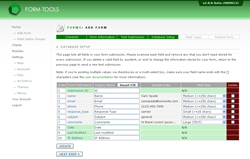Adding a POST form
So far so good! Form Tools has now received your test submission; the vast majority of the technical stuff is done. You haven't quite reached the point where you're cracking open the champagne, but you're getting close.
Now it's mostly just a matter of configuring your form fields to make them look and behave like you'd expect within the Form Tools UI. This step gathers information about your fields so that it can create a custom database table to store all future form submissions. Here's what all the columns and features of this page mean:
Order
This field determines the default order of your form fields as they will be listed
in the administration pages. Generally you'll want to arrange these in a logical manner,
but it doesn't terribly matter: every time the administrator or client looks at the form
data it will be through a View. Each View can be sorted in whatever way you want.
Form Field Name
The name of your form field. This is included for reference, so you can see at a glance
what the row is all about.
Display Name
The display name should uniquely identify your field within your form. It should serve
as a simple label like "First Name", "Email", "Contact Phone Number" or something along
those lines. The Smart Fill button makes it's best guess at filling in the
display names based on the names you've given your form fields.
Tip: if you'd like the Smart Fill option to work as effectively, you'll need to format your form fields with underscore notation, like so company_name, first_name and email. These get Smart-Filled as Company Name, First Name and Email respectively. Smart Filling works by converting all underscores to spaces and then uppercasing the first letter of each word.
Tip: if you'd like the Smart Fill option to work as effectively, you'll need to format your form fields with underscore notation, like so company_name, first_name and email. These get Smart-Filled as Company Name, First Name and Email respectively. Smart Filling works by converting all underscores to spaces and then uppercasing the first letter of each word.
Sample Data
This column is again included just for reference: it shows the contents of the field
that was originally submitted.
Field Size
This column determines how much storage should be allocated for this field in the
database. This field is a common source of error. If you ever see your data get chopped
off in the UI, or find that fields with field options groups (dropdowns, checkboxes &
radios) sometimes don't show up properly, it's probably because the form data got
truncated.
There are five field sizes. Don't pick the option that fits MOST data for this field, but for ALL data. Even if 99% of your fields will be under 20 characters, if there's one field that could be 21 characters pick the Medium field size.
There are five field sizes. Don't pick the option that fits MOST data for this field, but for ALL data. Even if 99% of your fields will be under 20 characters, if there's one field that could be 21 characters pick the Medium field size.
- Tiny <= 5 chars
- Small <= 20 chars
- Medium <= 256 chars
- Large (TEXT) - 65,535 characters
- Very Large (MEDIUMTEXT) - 16,777,215 characters
